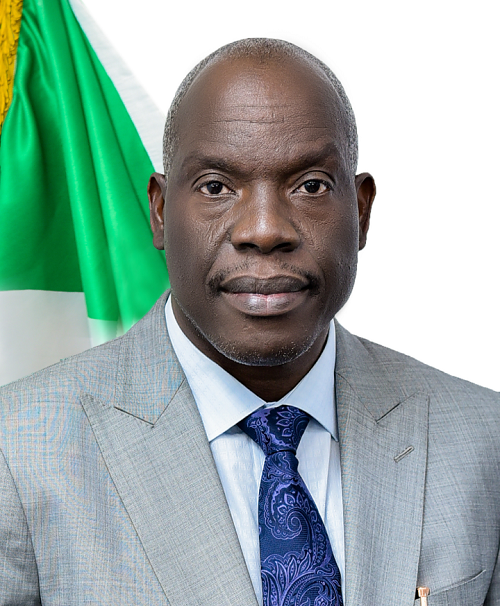Engr. Gbenga Komolafe, CCE of NUPRC
..Africa should be concerned on different pathways to energy transition.
…Nigeria can be described as a gas rich nation ranking first in Africa in reserves.
-Felix Douglas
Declaring the 16th Nigeria Association for Energy Economics (NAEE) open in Abuja recently, Engr. Gbenga Komolafe, Commission Chief Executive (CCE), of Nigerian Upstream Petroleum Regulatory Commission (NUPRC), extolled the consistency and resilience of organising the annual event.
It will be recalled that NAEE is known as one of the energy associations in sub-Saharan Africa that is made up majorly by intellectual powers from the university system across Africa.
The theme of this year’s conference is: Energy Evolution, Transition and Reform: Prospects for African Economics.
Komolafe pointed out vividly that NAEE has continued to play an active role in building professional capacity for the oil and gas and power sectors in Nigeria. “This event over the years has brought to light doggedness of the association in keeping with the objectives of providing a forum for exchange of ideas for the advancement of professionals experienced in energy economics, promoting the understanding of energy related issues and contributing to national conversations globally particularly in Nigeria.”
“Over the last three centuries, the world has witnessed evolution of various energy sources from the traditional way to pump oil and gas, hydro power, wind, solar, green hydrogen and other renewables.”
However, today’s oil and gas has remained the most dominant source of the energy mix. The global call for decarbonisation is the main focus of cleaner energies and provided the avenue for Africa to diversify its portfolio while leveraging its abundant oil and gas resources for energy security and economic development.
Africa with its vast sources of renewable energy has the potential with the right leadership and adequate financing to easily transit to other cleaner sources of energy.
“The keynote speaker, Dr. Omar Farouk Ibrahim, has laid a solid background for the conversion here today and for us we believe that Africa is dominantly position given its population that is about 1.4 billion, compared with the entire population of Europe just about 50% of population of Africa and if you combine the population of the entire United States with that of Europe is just about the population of Africa.”
Therefore, Africa is dominant and cannot be undermined.
Komolafe stated further that what Africa should be talking about is the right energy mix because it has all the sources of energy. In terms of transition, the Western world is serious about it and is gaining momentum. “If you travel to the Western world, you see charging points everywhere springing up signaling the fact that they are determined in the direction of energy transition.”
Africa should be concerned on different pathways to energy transition considering the fact that the continent is well blessed with different energy mix. The continent should be focused and show concern about energy transition and attaining the right mix, it has been endowed with including many resources such as solar, biomass, hydrogen among others.
The NUPRC Chief asserted that in terms of financing, with a unified African market, the continent should look inward which is part of advocacy of the NAEE conference. The continent has the capacity to finance the right energy mix for the benefit of its people. Global call for decarbonisation and increased focus for cleaner energies has provided an avenue for Africa to diversify its portfolio while leveraging its abundant oil and gas resources for energy security and economic development.
Africa, with its vast resources of renewable energy has the potential with right leadership for adequate financing to easily transit to the use of other cleaner sources of energy. Nigeria and other African countries rich in hydrocarbon are gradually shifting thier attention to use of natural gas as a major source of energy. While continuing with the exploitation of oil resources which is now the main major source of revenue.
For the government, it is important to know that oil and gas will continue to guarantee energy security for its massive population estimated in the neighbourhood of 200 million people and with a reserve base of 36.97 billion barrels of oil and 2 trillion cubic feet (tcf) of gas which represents 33% of the entire Africa total gas reserve of 620 tcf.
Nigeria can be described as a gas rich nation ranking first in Africa in reserves with a life span of 94 years. This clearly presents Nigeria in a dominant position in the entire African gas market. The country has the potentials to retain and sustain supply of natural gas across Sub Saharan region of Africa if the necessary financing and infrastructure are in place.
Engr. Komolafe believed that Petroleum Industry Act (PIA) 2021 has brought significant reforms in Nigeria petroleum industry. The Act has also engender desired reforms aimed at ensuring rapid development and effective production of the country’s gas resources by providing active fiscal terms for investors. For instance, the Act provides for lower royalty rate for domestic gas that is about 5%. The commission has also developed key regulations and initiatives that will ensure accelerated gas exploration and development to different domestic use for industrialization and export opportunities for enhanced revenue generation.
Therefore, optimistically, the NAEE conference will achieve its intended objectives given the depth of the event content, caliber of speakers most of whom are professors assembled for the program. Expectedly, proceedings of the conference should be made available to government as input for policy formulation in the energy and power sectors for the new administration. Proceedings of the conference should be made available for government as part of input for policy formulation.
“It is expected that deliberations in this conference will set unique opportunity to address issues ranging from multi-dimensional poverty in Africa, energy access, funding gap for energy development, impact of energy transition, sustainable economic development, carbon footprint reduction and mitigating the adverse effects of climate change.”


Comment here